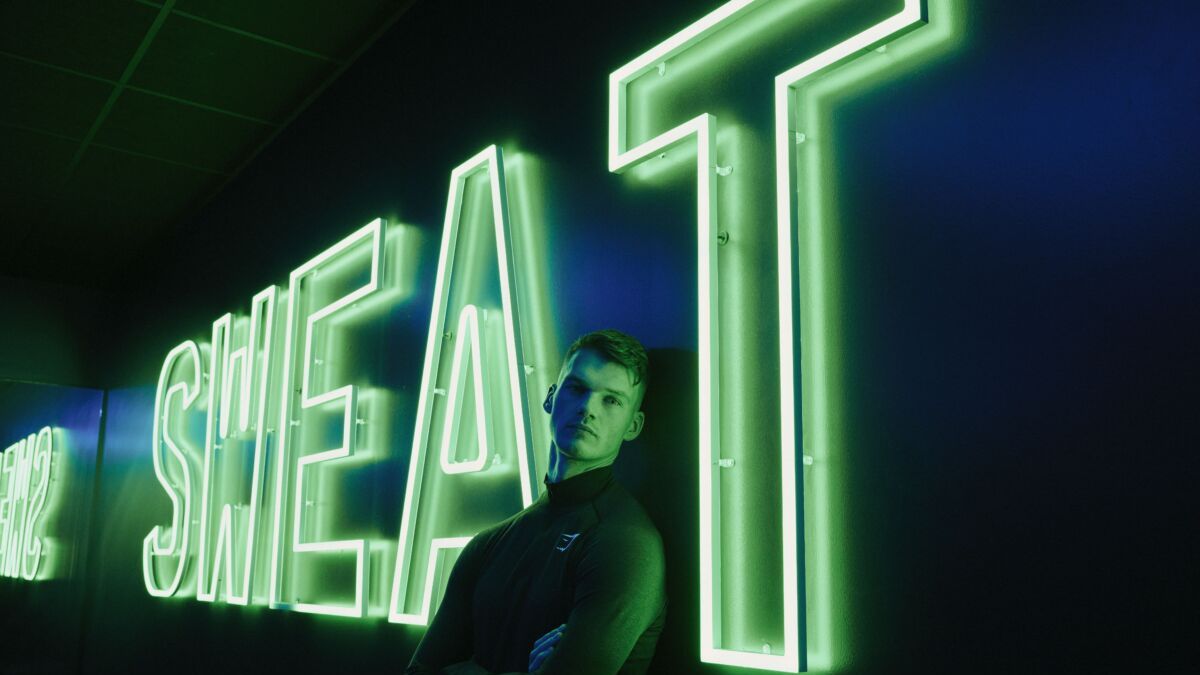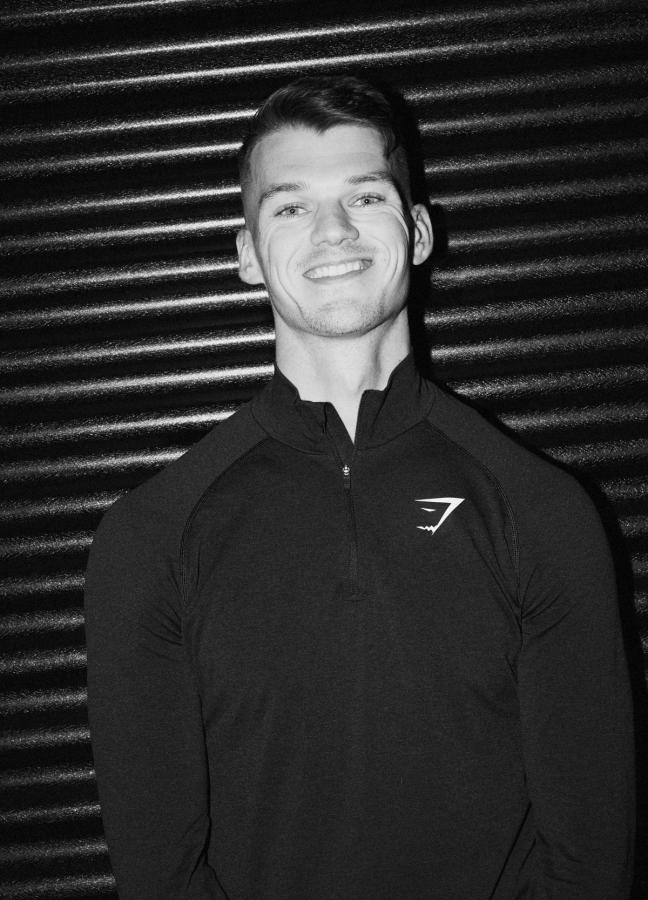

“We made more money in half an hour than we had done in the entire history of the business…”
Ben Francis charts Gymshark’s journey from bedroom business to billion pound valuation
When Mark Zuckerberg handed himself the Facebook top job at the age of 22, he had his business cards embossed with the immortal words: “I’m CEO, bitch.” When Ben Francis took on the same role at Gymshark just a few months ago, he probably just sat down for a nice cup of tea. Tech journalists, Netflix commissioners and gunslinging VCs tend to like their young founders big, brash, and bombastic — turning up to investor meetings in their pyjamas (Zuckerberg), chugging Jose Cuervo mid pitch deck (Adam Neumann), or sporting black turtlenecks and lying through their teeth (Elizabeth Holmes.) But the founders we deserve, perhaps, look a lot more like Ben Francis — the 29-year-old who grew Gymshark from a bedroom business to a billion pound valuation in less than ten years, and never lost his head along the way. On the walls of the company’s shiny, sprawling campus up in Solihull — a place whirring with animated young creatives and giant neon logos — there’s a telling phrase printed in black lettering: “work hard, stay humble.” But it might as well say: “Nice guys finish first.” Because Ben Francis is, and he did.
“You can be the most or the least talented person in the world,” Francis tells me, sitting at one end of a vast concrete table in the campus boardroom. “But being humble is so, so important. And particularly in a brand like Gymshark, which is growing so quickly that it can be easy to get caught up in your own hype. So we remain humble, remain level-headed — and hopefully that will hold us in good stead moving forward.”

It has certainly done the trick so far. Founded in 2012 as a supplement dropshipping service, the brand’s big breakthrough came when one of their tracksuits went viral following a trade show in Birmingham in 2013. In half an hour, Francis and his friends sold £30,000 worth of stock, after averaging £300 a day for years. “That was the moment when I thought: I think we’re on to something special here.” And the milestones have dropped off nicely ever since. In 2016, Gymshark was named the UK’s fastest growing company in The Sunday Times Fast Track 100. In the summer of 2020, private equity behemoth General Atlantic scooped up a 21% stake of the business for $261.7 million, valuing Gymshark at over £1 billion — a British unicorn. And earlier this year, Francis — whose 70% stake meant he could have drifted off happily into the sunset before even his 30th birthday — took on the CEO role for the very first time. In a rare interview, the founder talks us through the highs and lows of that particular journey — from first sale, to ego death, and back again — and explains how his overnight success took a decade.
We’re sitting here in the new-ish GymShark campus. How do you feel now, when you look around you at the place you’ve built?
We were working late last night, and when I was leaving it was dark and the car park was empty. And to look back and see the logo — it’s really, really cool. I do love it here. Generally, you come in, and do your busy day, go off to the gym and then go home. But occasionally you do look back and think — this is a busy place.
I’ve heard you speak in the past of feeling like you’re ‘winging it.’ Do you still feel that way, even now?
I think so. As a business we’re at a stage that not many businesses have been before. Obviously businesses have been at our scale before. But to do it online-only, to be building the community that we’re building, to move as quickly as we are — it hasn’t really been done before. So everyday’s a learning experience for me.
Let’s go back to the start. What were you like growing up?
I grew up literally twenty minutes from here. I was quiet, very shy — I loved playing football, and was a massive Villa fan. As I got older, I started playing games — Fifa, Call of Duty, World of Warcraft on the computer. I was just a fairly chilled, quiet lad that just loved football and games.
"I launched seven apps prior to Gymshark — and none of them made any money
Did you come from a particularly entrepreneurial family?
My parents didn’t run their own businesses. My mom worked in the NHS her entire life, and my dad worked in networking. All of my grandparents ran their own businesses, which was really cool to see. At about 14 I did work experience, and that was my first experience of business, of entrepreneurship. I went with my grandad, and he would line furnaces with either brick or ceramic fibre, and I would basically do manual labour for him. It taught me a lot about hard work, for one. But it also allowed me, in those long hours together, to talk about different things with him. He would explain to me some of the risks he took in his business, and he talked about the fact that he’d risked everything he’d ever had on a particular job, and would go home and be nervous about whether he could provide for my nan, my mum and her sister. Being exposed to that at a young age meant that, when the time came for me to start my own businesses, risking my four or five quid an hour at pizza hut — compared to the risk he took — it was incomparable.
I was fortunate enough to stay on and do sixth form at the school I was at. And I did a BTEC course in IT. That was massive to me, because I had things that I wanted to do, and I had passions, and at the time I was massively fitness focused. But I didn’t really have a method by which I could create. So during my BTEC, I learned how to build websites and apps. I would build fitness apps and websites — creating maybe six or seven different apps prior to building the GymShark site. None of them made money. But I didn’t do it to make money then.
I’ve heard you say before that going to the gym changed your life. What do you mean by that?
In a sentence, I think the gym taught me structure and it taught me accountability. At school, it always felt like what I put in didn’t always match what I got out. And in the gym that completely changed. I knew that if I turned up to the gym, five days a week, and followed the routine I was given, that in a year I would be in a better place than when I started. It taught me the value of routine. Funnily enough, I soon applied the mentality I’d learned in the gym to my sixth form studies, and I went from Ds in my GCSEs to As in my A-levels.
How did Gymshark come about?
The bar back then was low: I just wanted to make a website that transacts in the fitness realm. As for the name, I saw an image on the internet — I think it was an American football mascot; a cat of some sort, but a very muscular cat. I thought: imagine if that was a shark. So the first logo was the flexing shark. It was all very much a passion project — there was no long term plan. I wanted to make a website that transacts, and the Gymshark domain was available. We literally went from there. We have literally always approached things one step at a time. In the long term, it looks like these huge changes have been made. But they’ve been approached in a really logical, small way.
The first product that we did were supplements. A friend of mine worked locally for a company called USN, a really cool supplement company. I think he said the minimum order was £8,000, and I remember thinking there was no chance we could get our hands on that. So we started to drop-ship supplements, and we’d load up the website with all the supplements you could imagine, and they would trigger an order from another retaile, and we’d make a small margin.
It took a few months, and we got our first sale — a tub of USN hyperbolic mass. It sold for £52, and cost us £50 shipped and delivered — so we made £2. But because our ambition was just to build a website that transacts, I was buzzing. I was literally dancing around my bedroom.

How did you begin making workout gear?
I was massively inspired by what a lot of the big lifters were wearing in the US. But we would order this product, and it would be massively too big and wouldn’t fit us. So we bought a sewing machine and a screen printer and started to hand make the clothes we wanted to wear in the gym. In a way, it was a little bit selfish: we just made the clothes we wanted, because no-one else did. Then we started to send them to our friends. Then we sent them to our heroes. Then we really started to build it as a business.
I’ve read before that an event [setting up a stand at BodyPower trade show at the NEC] changed your fortunes overnight…
It was one of those things done on gut feeling that really just felt right. Before the event, for context, we were doing around £200 to 300 a day in revenue. After the event, we went from £300 a day to £30,000 in revenue in the first half an hour the website was live. We did more in revenue in half an hour than the entire history of the business. That was the moment when I thought: I think we’re on to something special here.
You set the business up with family and friends. Was that ever difficult?
It always is. There’s this weird line where you always have to do what’s right for the business, and there’s certain friends that might not be able to grow with the business. That’s just something that naturally happens. There were definitely times where I worked with friends who I wished had been able to grow with the business, but couldn’t, which was a shame. But in my experience on the whole it has been positive.
Gymshark used influencers before they were called influencers. Has that become something of a dirty word in marketing now?
Influencers are not a new thing. I was recently in the jewellery quarter in Birmingham, and I found out that all the jewellers would try and get their jewellery on the royal family whenever they visited, because they knew that if they did, everyone would want it. So the whole concept of influencer marketing is certainly nothing new.
You have nearly 1000 employees, many of them young. How are you as a manager? How do you maintain a good culture in a place like this?
I think the thing I’m most proud of is the culture. There’s definitely a buzz here. You go to the gym after work, and everyone’s helping each other. There are so many people with different goals in terms of their fitness journey. And there’s an incredible level of togetherness. And I think it’s a place where people who do want to improve themselves definitely come. Managing that through growth is tough, though. And managing that through growth and covid has been incredibly tough. Adding to that the fact that we are growing internationally as well — we’ve opened up offices in Hong Kong, Mauritius and Colorado — then it becomes even more difficult. But for me, clearly it starts at the top. I think I need to hold myself to account, to be as transparent and available to as many people as possible.
It’s about the way you act everyday. The way you treat people. We have a sign out here that says “work hard and stay humble.” You can be the most or the least talented person in the world, but being humble is so, so important. It’s particularly important in a brand like GymShark, which is growing as quickly as we are, it can be easy to get caught up in your own hype. So remain humble, remain level-headed, that will hold us in good stead moving forward.
"The whole world came crashing down. I had a complete ego death..."
How do you stay humble?
I’m surrounded by more than enough people that would pull me down very quickly if I wasn’t humble. They’d rip me apart if I got cocky.
A few years ago, we did a 360 feedback session, where everyone writes anonymous feedback to everyone else. There were probably 12 or 15 people who contributed to mine. I got the documents back — and I was horrified, heartbroken. It was awful. As with everyone who looks at their 360 feedback for the first time, I ignored all the good bits and focused on the bad ones. I clearly wasn’t self-aware enough, because I thought it wasn’t an accurate reflection of me at all.
I think I was probably a bit more hot headed when I was younger. Probably too quick to make decisions without all the information I needed. I took the report home and left it on the side. I came back a little later on, and my other half was sat there, and she’d just finished reading it. To be honest, I’m quite embarrassed to say that I was really annoyed with her. I said ‘don’t read that, it’s nothing like me.’
Then she said: “it’s probably the most accurate thing I’ve ever read about you.” At that point, the whole world came crashing down. I had a complete ego death, realised she was right, and I was wrong. It was that point that I went back and re-read it, and used that to provide myself with a self-development plan. I must have had that feedback when I was 24 or 25 — about 4 years ago now. It was probably one of the most helpful things I’ve ever done.

What have you learned from other, perhaps more senior entrepreneurs along the way?
One of the things I enjoy doing the most is learning from great people. I’ve still not met anyone, no matter how successful, that isn’t just winging it. Everyone is learning on the job, and working it out as they go. The one thing I will say to every entrepreneur is that if you’re not winging it and making mistakes, you’re not pushing yourself hard enough.
For the most part, the successful people I’ve met are very good people. They’re very caring and empathetic and understanding. They’re successful because of the people around them, and because they’re incredibly good at working with others. When you think about entrepreneurship and starting out, it seems like there’s so much focus on the entrepreneur, the founder. But ultimately it’s around your ability to solve problems, build teams, and be the person people want in the room.
What are the parts of the job you struggle with?
I’m four months into my role as CEO and I’ve never done that job before. There’s elements I need to work on. I’m a terrible networker. I’m so bad at that. A lot of successful people seem to be very good at it. And I don’t want to be a networker for the sake of it. I’m very much about what’s in front of me. I don’t think I’ll go and text that person — and I think that’s something I could be better at.
"Everyone is winging it. Everyone is learning on the job..."
[Investor, entrepreneur and social media personality] Gary Vaynerchuk has just joined your board. What’s he like?
Gary is the same Gary you see on line, but he is so much more intelligent and thoughtful than maybe what comes across in his socials. Pull away the facade, and he is a wildly successful and intelligent business person as well. He was an early investor in Facebook and Uber. Because he’s been involved in society since the early days, he has this ability to connect the dots. He’ll look at things, and give examples of different things that have happened in different areas or in the past. I imagine his pattern recognition skills are very good.
Why did you decide to step into the CEO role? You could have drifted off into the sunset…
I could have had a much easier life, that’s for sure. But I really love the people in this business, and I love being a part of it. That’s really important to me. I just love being involved in the business — and there’s no role more involved in this.
Read next: How Scooter Braun masterminded modern music


